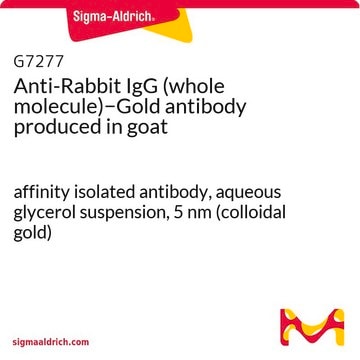G7527
Anti-Mouse IgG (whole molecule)–Gold antibody produced in goat
affinity isolated antibody, aqueous glycerol suspension, 5 nm (colloidal gold)
About This Item
Recommended Products
biological source
goat
conjugate
gold conjugate
antibody form
affinity isolated antibody
antibody product type
secondary antibodies
clone
polyclonal
form
aqueous glycerol suspension
particle size
5 nm (colloidal gold)
storage temp.
2-8°C
target post-translational modification
unmodified
General description
Application
Biochem/physiol Actions
Other Notes
Physical form
Disclaimer
Not finding the right product?
Try our Product Selector Tool.
Storage Class
10 - Combustible liquids
wgk_germany
WGK 3
flash_point_f
Not applicable
flash_point_c
Not applicable
ppe
Eyeshields, Gloves, multi-purpose combination respirator cartridge (US)
Certificates of Analysis (COA)
Search for Certificates of Analysis (COA) by entering the products Lot/Batch Number. Lot and Batch Numbers can be found on a product’s label following the words ‘Lot’ or ‘Batch’.
Already Own This Product?
Find documentation for the products that you have recently purchased in the Document Library.
Customers Also Viewed
Our team of scientists has experience in all areas of research including Life Science, Material Science, Chemical Synthesis, Chromatography, Analytical and many others.
Contact Technical Service









